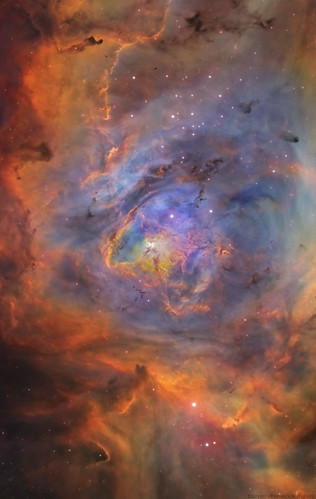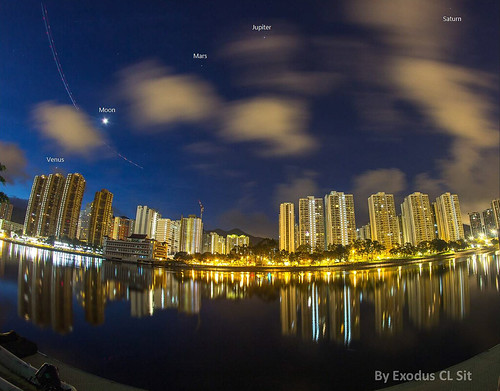Page 3 of 5
Re: Submissions: 2022 June
Posted: Sun Jun 19, 2022 5:01 am
by macnenia
Saturn with the resplendent colours of its Southern Hemisphere
As Saturn moves around the Sun in its 30 year orbit, its rings maintain the same orientation with respect to the Sun. In 2018 that orientation was such that the rings were fully tilted towards the Sun and the Earth and we could see the northern hemisphere of the planet including the iconic hexagonal polar vortex. However, the southern hemisphere was completely hidden from our view by the rings. 4 years later in 2022, Saturn has moved in its orbit and by virtue of the fact the rings have maintained their same orientation in space we now see them more side on. This results in the narrowing of the ring tilt, gradually revealing the southern hemisphere of the planet. The color scheme of the southern banding including blues, purples and turquoise has become apparent and is quite magnificent. Equally, atmospheric features such as eddies, festoons and ovals can now be resolved as they are here. The rings will become edge on in 2025, before tilting the other way to more fully reveal the southern hemisphere.
The Lucky Imaging technique employed to produce this image resulted in the integration of 87,000 images to allow the Earth based amateur astronomer to largely negate the effects of the atmosphere and to resolve details such as can be seen here.
OTA: C14 Edge HD
Camera: ZWO ASI 178MM
Barlow: Siebert UV 1.5X
Filters: Chroma RGB
Frames stacked: 87,000
Frame rate: 75 frames per second
Exposure: 13ms
Captures: 11 RGB runs of 90 secs per colour channel
Re: Submissions: 2022 June
Posted: Sun Jun 19, 2022 9:13 am
by WolfHeart
Cygnus Clouds
Cygnus region is a rich with excited ionized Hydrogen gas and its where the North America Nebula, Pelican Nebula, Butterfly Nebula and Crescent reside. So I decided to frame the most dense are in that region and using a fast lens like the Rokinon 135mm and a dual band filter to extract Ha and OII and to recombine them in a mainly HOO color pallet but with OIII coming from the Green and Blue channel.
 Cygnus Clouds AB 2
Cygnus Clouds AB 2 by
Ahmed Waddah, on Flickr
Date: 28/5/2022
102X180"
Nikon Z6II-Ha Modified
Rokinon 135mm @2.8
Fornax Lightrack II
IDAS-NBZ-Fast
Location: Whie Xesert, Madonna
bortle:2
https://www.astrobin.com/m7suyg/
Facebook:
https://www.facebook.com/waddah.photography
Astrobin:
https://www.astrobin.com/users/WolfHeart/
IG:
https://www.instagram.com/waddahphotography/
Re: Submissions: 2022 June
Posted: Sun Jun 19, 2022 2:53 pm
by matthewchin
2022 The Signs in Celestial Parade, (Venus, Jupiter, Mars, Saturn), in Yuen Long, Hong Kong
----------------------------------------------------------------------------------------------------------------
The "+" is seen after sequence of Venus and Jupiter, "\" for Mars, and "/" for Saturn appeared before dawn, taken and stacked around 5am HKT Apr22 to May9, 2022, in Yuen Long, Hong Kong.
'+' is Venus and Jupiter
'\' is Mars
'/' is Saturn
Stars are missed in 4 days (included May 1), as they are behind the clouds.
Moon (from top to bottom): is seen on Apr25, 26, 27.
Equipment : Nikon D750 with 28mm lens
Taken: (2022/4/22 - 2022/5/9 ~5am HKT) in Yuen Long, Hong Kong
------
https://blogger.googleusercontent.com/i ... 600-2s.jpg
OR Please download image:
https://i.imgur.com/7I1dZHD.jpg
Re: Submissions: 2022 June
Posted: Sun Jun 19, 2022 7:47 pm
by ejhebert
I present NGC-6960, The Witch's Broom processed in the HOO pallet.
Part of the Cygnus Loop, a supernova remnant, lies The Witch's Broom. An estimated 10,000-20,000 years ago, a star that was 20 times more massive than our Sun exploded creating this impressive sight. The explosion would have been brighter than Venus and even visible during the day.
https://astrob.in/52nnuu/0/
Target: NGC-6960
Imaging Telescope: Explore Scientific ED127 CF
Imaging Camera: ZWO ASI2600MM-Pro
Guide Scope: Explore Scientific ED127 CF
Guide Camera: ZWO 290mm-Mini
Mount: Sky Watcher EQ8-R Pro
Polar Alignment: ASIAir Plus
Bortle Class: 6
100 x 180s (Ha) – 5 Hrs
100 x 180s (OIII) – 5 Hrs
Filter: Chroma 3nm
Integration: PixInsight
Topaz Denoise
Adobe Lightroom Express
18/19 Jun 2022
Re: Submissions: 2022 June
Posted: Mon Jun 20, 2022 12:04 pm
by ejhebert
I present an alternate version of NGC-6960, The Witch's Broom processed in the HSO pallet.
Part of the Cygnus Loop, a supernova remnant, lies The Witch's Broom. An estimated 10,000-20,000 years ago, a star that was 20 times more massive than our Sun exploded creating this impressive sight. The explosion would have been brighter than Venus and even visible during the day.
Full Resolution:
https://astrob.in/ni6mp8/0/
Target: NGC-6960
Imaging Telescope: Explore Scientific ED127 CF
Imaging Camera: ZWO ASI2600MM-Pro
Guide Scope: Explore Scientific ED127 CF
Guide Camera: ZWO 290mm-Mini
Mount: Sky Watcher EQ8-R Pro
Polar Alignment: ASIAir Plus
Bortle Class: 6
100 x 180s (Ha) – 5 Hrs
100 x 180s (OIII) – 5 Hrs
100 x 180s (SII) - 5 Hrs
Filter: Chroma 3nm
Integration: PixInsight
Topaz Denoise
Adobe Lightroom Express
18/19/20 Jun 2022
Re: Submissions: 2022 June
Posted: Mon Jun 20, 2022 2:14 pm
by Anthony Husson
Sharpless 115
https://cdn.astrobin.com/thumbs/77Twaqs ... UALzhf.jpg
Full version :
https://www.astrobin.com/full/2edde4/0/
Sh2-115 is a faint emission nebula cataloged by Stewart Sharpless in 1959. It is located in Cygnus, just 1 and 2 degrees northwest of Deneb, the brightest star of that constellation.
Shining with the light of ionized atoms of hydrogen, sulfur, and oxygen in this Hubble palette color composite image, the nebular glow is powered by hot stars in star cluster Berkeley 90. The cluster stars are likely only 100 million years old or so and are still embedded in Sharpless 115. But the stars' strong winds and radiation have cleared away much of their dusty, natal cloud. At the emission nebula's estimated distance, this cosmic close-up spans just under 100 light-years.
Abell 71, is the designation of the small round patch of emission nebulosity to the left of Sh2-115. It is also known as Sh2-116 and PK85+4.1. The latter being designated as a planetary nebula, but it has more recently been described as a small patch of emission nebula.
Details: mosaic 2 panels
Integration : 69Hours 30mn
409x300sec Ha
222x300sec OIII
203x300sec Sii
Date: april 28-29 / may 1-2-15-16-17-18-19-20-21-22-23-24-28-30 / june 1-2-4-5-6-8-11-12-13.
Telescope: TS ONTC 10"
Camera: QHY268M
Mount: iOptron cem120
Filters: Antlia Pro 3nm Ha OIII & SIII
Software & processing : N.I.N.A, PHD2, PixInsight & Photoshop
Carpentras, Vaucluse FRANCE
Bortle Dark-Sky Scale: 6.00
copyright: Anthony Husson
Astrobin :
https://www.astrobin.com/users/Anthony_Husson/
IG :
https://www.instagram.com/ah_astrophotography_/
Re: Submissions: 2022 June
Posted: Mon Jun 20, 2022 3:11 pm
by MrRat
SH2-190 - 24 shots at 600 seconds each shot from my backyard with a ZWO ASI2600MC camera, William Optics GT81 telescope, and Losmandy GM811G equatorial mount. Just released photo but it was taken on Dec 03, 2021.
Re: Submissions: 2022 June
Posted: Mon Jun 20, 2022 10:03 pm
by ejhebert
Comparison of different processing pallets - HSO / SHO / HOO
Part of the Cygnus Loop, a supernova remnant, lies The Witch's Broom. An estimated 10,000-20,000 years ago, a star that was 20 times more massive than our Sun exploded creating this impressive sight. The explosion would have been brighter than Venus and even visible during the day.
Full Resolution:
https://astrob.in/3021a5/0/
Target: NGC-6960
Imaging Telescope: Explore Scientific ED127 CF
Imaging Camera: ZWO ASI2600MM-Pro
Guide Scope: Explore Scientific ED127 CF
Guide Camera: ZWO 290mm-Mini
Mount: Sky Watcher EQ8-R Pro
Polar Alignment: ASIAir Plus
Bortle Class: 6
100 x 180s (Ha) – 5 Hrs
100 x 180s (OIII) – 5 Hrs
100 x 180s (SII) - 5 Hrs
Filter: Chroma 3nm
Integration: PixInsight
Topaz Denoise
Adobe Lightroom Express
18/19/20 Jun 2022
Re: Submissions: 2022 June
Posted: Tue Jun 21, 2022 12:46 pm
by Lucadinoi
M27 nebula
TS RC 12 "reduced telescope with Astro-physics telecompressor
Omegon 90/500 guide tube with Omegon Velox 224 chamber Moravian G2 8300 camera with internal filter wheel
Ioptron Cem120 mount Moonlite focuser and 3.5 "electronic rotator
Electronic temperature control, ventilation and anti-condensation bands
Cls ccd, R, G, B, Ha 6nm filters, all Astronomik
Shooting data:
72 x 300s Luminanza 6h
51 x 600s Ha 6nm 8.5h
31 x 240s R 2h
31 x 240s G 2h
31 x 240s B 2h
Acquisition and management software: Sequence generator pro, Phd2, Ioptron commander, Anstap
Processing Software: Pixinsight, Photoshop, star spikes, astronomy tools
Autor: Luca Dinoi
Re: Submissions: 2022 June
Posted: Tue Jun 21, 2022 4:16 pm
by blastrophoto
The Heart of the Lagoon
Link to full resolution image.
https://flic.kr/p/2ntoiaW
Commonly known as the Lagoon Nebula, M8 was discovered in 1654 by the Italian astronomer Giovanni Battista Hodierna, who, like Charles Messier, sought to catalog nebulous objects in the night sky so they would not be mistaken for comets. This star-forming cloud of interstellar gas is located in the constellation Sagittarius and its apparent magnitude of 6 makes it faintly visible to the naked eye in dark skies.
I'm extremely proud to present to you, Messier Object 8, the Lagoon nebula. When I planned on imaging Messier 8, I hadn't realized that it would soon become one of my favorite images to date. The billowing dust within the heart of this incredibly bright deep sky object stood out to me as one of the most unique features I'd ever seen in a deep space image. I spent extra time to carefully ensure that I didn't lose detail by blowing out the brightness within the core. Who knew that such majestic wonder could be captured from a suburban backyard.
Gear:
Explore Scientific ED127 FCD100
ZWO ASI2600mm
Optolong Ha 7nm 2" filter
Astronomik 12nm OIII 2" filter
Astronomik 12nm SII 2" filter
Skywatcher EQ6-R Pro
ZWO OAG-L
ZWO 2x5 EFW
ASI120mm guide camera
Integration Time: Data acquired on June 17th, 2022
SII - 30x180s
Ha - 30x180s
OIII - 30x180s
Total: 4hrs 30min
Processed in PixInsight and Photoshop
Location: Woodbridge, VA
Photographed and Processed by Brandon M. Lewis (blastrophoto)
Re: Submissions: 2022 June
Posted: Wed Jun 22, 2022 9:48 am
by a.carrozzi
Solar Chromosphere in H-Alpha taken on the morning of June 18th, 2022.
The image shows active regions s AR 3030 and 3032 with a huge filament and a pair of prominences on the edge, too.
Tecnosky 152/900mm with Daystar Quark Chromosphere. ZWO ASI 174MM. Mosaic of 4 panels.
Autor: Alessandro Carrozzi
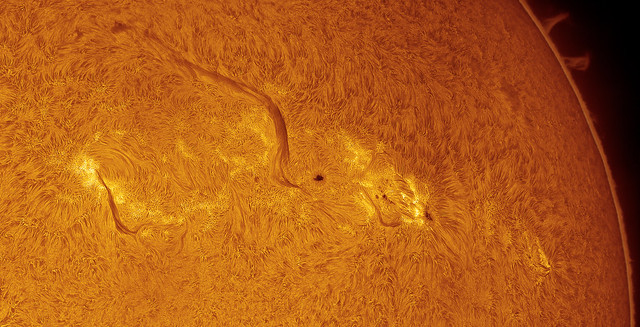 Sun in H-Alpha - June 18th, 2022
Sun in H-Alpha - June 18th, 2022 by
Alessandro Carrozzi, su Flickr
Re: Submissions: 2022 June
Posted: Wed Jun 22, 2022 11:18 pm
by Meiying Lee
On June 23, 2022, the sky is clear this morning, and the planets are still aligned on the ecliptic, drawing a large arc in the sky. Mars and the moon conjunct, the two are very close together. On the pink eastern horizon, the Pleiades sit next to Venus, with the rare planet Mercury below. The stars
Re: Submissions: 2022 June
Posted: Thu Jun 23, 2022 4:07 am
by Ann
blastrophoto wrote: ↑Tue Jun 21, 2022 4:16 pm
The Heart of the Lagoon
Link to full resolution image.
https://flic.kr/p/2ntoiaW
Commonly known as the Lagoon Nebula, M8 was discovered in 1654 by the Italian astronomer Giovanni Battista Hodierna, who, like Charles Messier, sought to catalog nebulous objects in the night sky so they would not be mistaken for comets. This star-forming cloud of interstellar gas is located in the constellation Sagittarius and its apparent magnitude of 6 makes it faintly visible to the naked eye in dark skies.
I'm extremely proud to present to you, Messier Object 8, the Lagoon nebula. When I planned on imaging Messier 8, I hadn't realized that it would soon become one of my favorite images to date. The billowing dust within the heart of this incredibly bright deep sky object stood out to me as one of the most unique features I'd ever seen in a deep space image. I spent extra time to carefully ensure that I didn't lose detail by blowing out the brightness within the core. Who knew that such majestic wonder could be captured from a suburban backyard.
Gear:
Explore Scientific ED127 FCD100
ZWO ASI2600mm
Optolong Ha 7nm 2" filter
Astronomik 12nm OIII 2" filter
Astronomik 12nm SII 2" filter
Skywatcher EQ6-R Pro
ZWO OAG-L
ZWO 2x5 EFW
ASI120mm guide camera
Integration Time: Data acquired on June 17th, 2022
SII - 30x180s
Ha - 30x180s
OIII - 30x180s
Total: 4hrs 30min
Processed in PixInsight and Photoshop
Location: Woodbridge, VA
Photographed and Processed by Brandon M. Lewis (blastrophoto)
I love this image.
I'll tell you up front that I'm normally no great fan of Hubble palette mapped color images, but I love your image and its colors. Your colors are soft and blend beautifully. I love how the central regions of the Lagoon are mostly blue in your image (but with splashes of soft yellow and orange and almost pink), while the "first outer border" is shown entirely in shades of orange, while the outermost border is a darker shade of orange, which is to say that it is brown.
And I just love the composition, too. Yes, I can see the well-known Hourglass Nebula (in white, and I appreciate the choice of color), and I can see the well-known dust funnels surrounding it. But what I have never seen (or paid attention to) before is the amazing almost heart-shaped dust lane "frame" that surrounds the area around the central Hourglass Nebula like a frame surrounding a beautiful painting.
I can see that you have flipped the Lagoon Nebula some 90 degrees "to its side", because cluster NGC 6530, which is usually seen to the left (east) of the central Hourglass Nebula, is now seen "above" it. By flipping the Lagoon Nebula this way, you force us to see it in a new way - or at least you forced
me to see it in a new way!
Thank you!
Ann
Re: Submissions: 2022 June
Posted: Thu Jun 23, 2022 11:25 am
by cdavmd
[
https://flic.kr/p/2ntRVYo]

Takahashi FSQ106
QSI683
Narrow Band Filters 3nm
SHO
21.5 Hours total integration
Re: Submissions: 2022 June
Posted: Thu Jun 23, 2022 5:58 pm
by the_astronomy_enthusiast
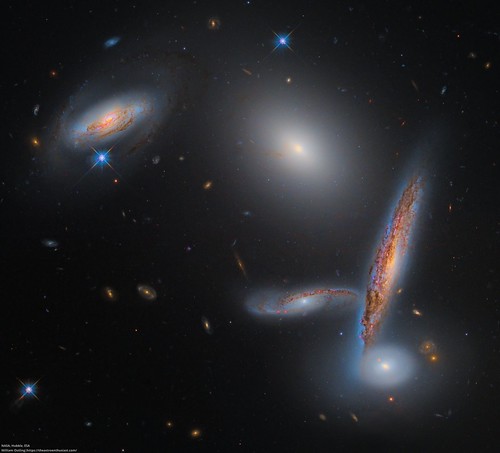 Hickson Compact Group 40 from Hubble
Hickson Compact Group 40 from Hubble by
William Ostling, on Flickr
Full write-up here:
https://theastroenthusiast.com/hickson- ... om-hubble/
NASA is celebrating the Hubble Space Telescope’s 32nd birthday with a stunning look at an unusual close-knit collection of five galaxies, called The Hickson Compact Group 40. This menagerie includes three spiral-shaped galaxies, an elliptical galaxy, and a lenticular (lens-like) galaxy. Somehow, these different galaxies crossed paths in their evolution to create an exceptionally crowded and eclectic galaxy sampler. Caught in a leisurely gravitational dance, the whole group is so crowded that it could fit within a region of space that is less than twice the diameter of our Milky Way’s stellar disk.
Website:
https://theastroenthusiast.com/
Instagram:
https://www.instagram.com/the_astronomy_enthusiast/
Re: Submissions: 2022 June
Posted: Fri Jun 24, 2022 1:23 pm
by Joel17
 6 planets and the crescent Moon
6 planets and the crescent Moon by
Joel Klinger, sur Flickr
Yesterday at 3:45am I have been chasing the planets in the morning sky of Tours (France).
That's what you see here, as shot at 4:55am: Venus rising, Mars close to the crescent Moon, Jupiter shining bright and Saturn in the upper-right corner - while Uranus and Neptune are also visible, as seen when zooming. You can also see the Pleiades above Venus.
Only Mercury is missing: I actually succeeded in capturing it, yet a little later when it came out of the fog at the horizon, while Uranus and Neptune were not visible anymore due to the brighter morning light.
Re: Submissions: 2022 June
Posted: Fri Jun 24, 2022 1:44 pm
by clsit
Planet Parade with Reflection
Credit: Exodus Chun-Long Sit
Date: 2022 June 24
Location: Shatin, Hong Kong
 PSX_20220624_183824
PSX_20220624_183824 by
Exodus CL Sit, 於 Flickr
 PSX_20220624_110127
PSX_20220624_110127 by
Exodus CL Sit, 於 Flickr
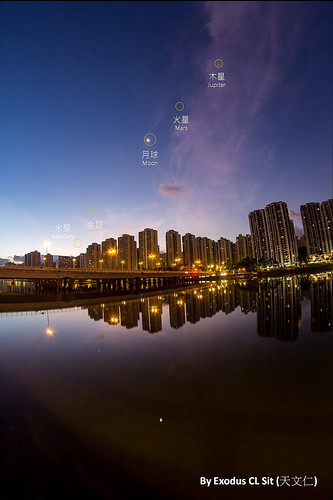 PSX_20220624_205934
PSX_20220624_205934 by
Exodus CL Sit, 於 Flickr
 PSX_20220624_121447
PSX_20220624_121447 by
Exodus CL Sit, 於 Flickr
Re: Submissions: 2022 June
Posted: Fri Jun 24, 2022 1:58 pm
by wrightdobbs
"All the planets in one photo"
Captured at St Cloud, Florida around 545am local time on June 24th, 2022.
"What a beautiful morning in Florida to capture the Planetary Alignment of Summer 2022. All the planets of our Solar System are pictured in this 3 image panorama taken from St. Cloud, Florida! What a sight this morning!
This alignment, minus the moon because it's entering the new moon phase, will be in this configuration through much of the summer. Mercury is about to transition to an evening sky object, and even when I photographed this it was extremely difficult to see Mercury in the clouds and bright twilight, so the next few days are your last chance to see it with all the other planets. Saturn is moving west in the sky though so it'll be harder and harder to get a photo of them "together" in the sky. Why aren't Uranus and Neptune labeled? They're too dim to be captured by this camera. However, if we could see them, Neptune would be a little to the right of Jupiter, while Uranus would be just to the bottom left of the Moon."
3 image panorama taken with a Sony a7ii camera, Sigma 14mm f/1.8 lens, ISO1600, f/6.3, 15 seconds.
https://twitter.com/WrightDobbs
https://www.facebook.com/wrightdobbsphotography
https://instagram.com/wrightdobbs
Re: Submissions: 2022 June
Posted: Fri Jun 24, 2022 5:33 pm
by mathcancer
Star Trails and Fireflies.

I set out to do some Milky Way photography, but the constant firefly flashing here in the Indiana summer was really striking against the stars above. They fill the trees with their own constellations of flashing, while others fly in front of you leaving their own light trails. I tried to capture that essence.
I took 13 30-second exposures (ISO 100) with a Sigma Art 24mm f/1.4 on a Nikon D5600, then stitched this together in Sequator. In photoshop, I stretched contrast and minorly tweaked yellow saturation to emphasize the fireflies and to match the on-the-ground human eye appearance. I didn't have enough time or battery to get dark and flat frames, so I minorly touched up in Topaz Denoise to eliminate hot pixels.
Gear:
Nikon D5600 (umodified)
Sigma Art 24mm f/1.4
Integration Time: 6.5 min
13 x 13s ISO 100
Location: Bloomington, Indiana
Data acquired and processed on June 24, 2022
Copyright: Paul Macklin
Full version:
https://www.astrobin.com/9gdnku/
Re: Submissions: 2022 June
Posted: Fri Jun 24, 2022 10:17 pm
by dvd007
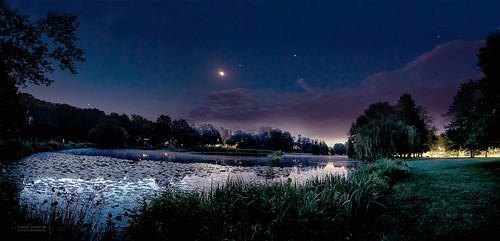 4 planets and the moon
4 planets and the moon by
David Duarte, sur Flickr
Alignment of the planets and the moon in the sky of Saint-Paul-lès-Dax at the Lake of Christus, June 23, 2022 at 5:30 am.
I just had time to take the 30 pictures before the clouds came.
Canon 60D
Sigma 10 mm
30 photos assembled in Gigapano
Photoshop
Photo engine
HDR
Re: Submissions: 2022 June
Posted: Sat Jun 25, 2022 1:15 am
by ImNewHere
 6-23-22-Sol_Plane1
6-23-22-Sol_Plane1 by
Scotty Bishop, on Flickr
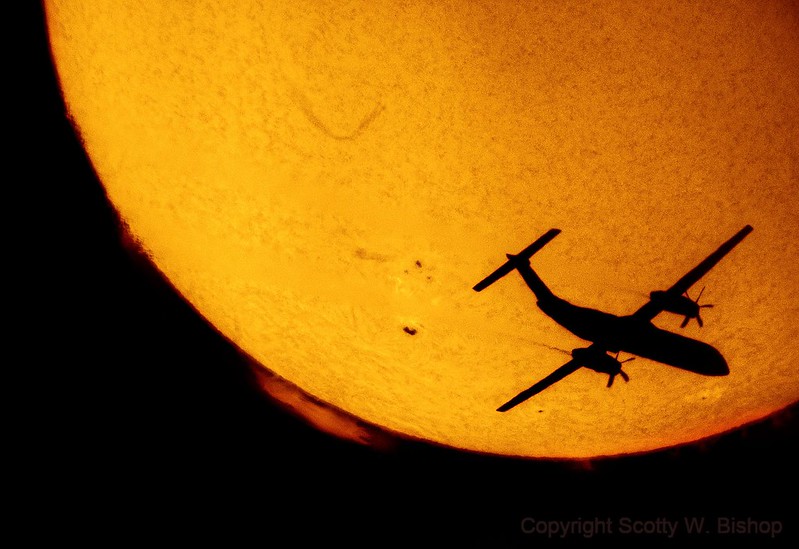 6-23-22-Sol_Plane2
6-23-22-Sol_Plane2 by
Scotty Bishop, on Flickr
Yesterday I was doing some Ha imaging of some pretty active areas on the sun using a Player One Apollo M Max, Daystar Quark Chromosphere, Daystar 80mm f/6 refractor, mounted on an iOptron CEM25EC and I had a plane photobomb one of my series of captures.
Re: Submissions: 2022 June
Posted: Sat Jun 25, 2022 5:26 am
by clsit
Re: Submissions: 2022 June
Posted: Sat Jun 25, 2022 11:16 pm
by astrosama
Planets Alignment over Sand dunes
the rare alignment of the 5 naked-eye planets and the Moon over the Sand dunes of the Egyptian western Desert near El-Fayoum
Time : 25 June 2022 at Dawn (4;00 Am Local time )
Gears :
Nikon Z6 Modified
Nikkor 14-24 mm
Samyang 85 mm
Settings :
Planets : 2 Photos*3 sec Iso 200 @ 14 mm , 2 photos *30 sec Iso 2500 @ 24 mm
Foreground : 5 Photos HDR , different Shutter @ ISO 800, @ 14 mm
Software: PS, Astrotools, and StarSpikes
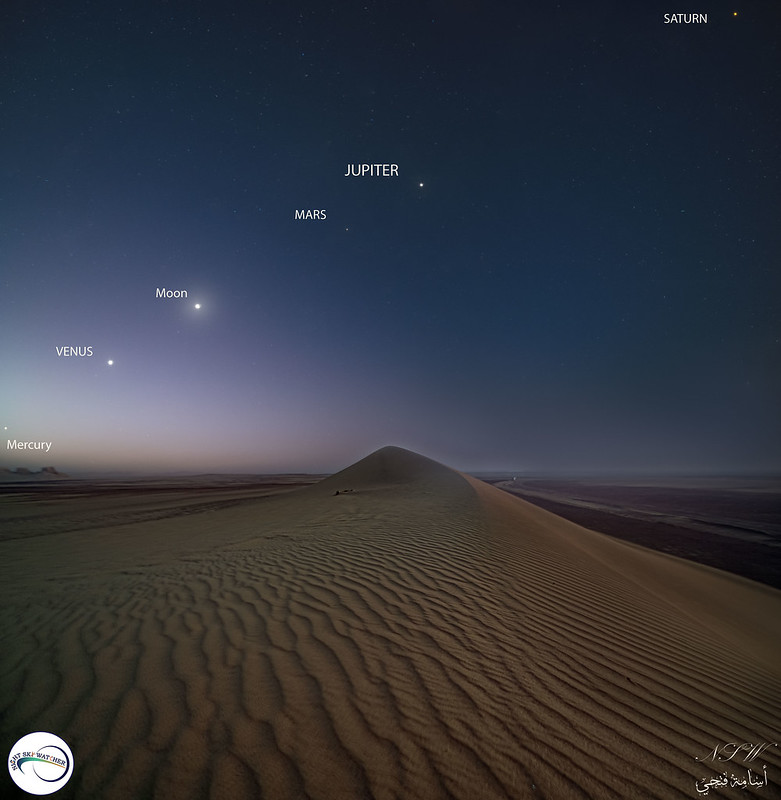 Planet-Alignment-Sand-dunes-c-
Planet-Alignment-Sand-dunes-c- by
osama Fathi, on Flickr
Credits: Osama Fat'hi
https://www.instagram.com/osama.fathi.nswatcher85/
Fayoum, Egypt
Re: Submissions: 2022 June
Posted: Sun Jun 26, 2022 12:17 am
by SteveJ
Holy Grail planetary alignment at dawn on 26 June 2022, Melbourne, Victoria, Australia
Copyright: Steve Johnston
A break in the clouds this morning allowed me to capture not only the five naked-eye planets, but to also image Uranus and Nepture, the latter being just a smudge on the full-size image. The position of Pluto is also shown in the west. A panorama of nine images, each 1.6 seconds exposure, taken with a Canon 6D and Sigma 24mm lens at f/1.8, ISO-400 and stitched in Microsoft ICE as a spherical projection. This is pretty much the holy grail of solar system imaging with a standard camera lens for me. If the weather becomes cloudy over the next week or two, I may not image this many planets in a single panorama again in my lifetime, or yours!
Re: Submissions: 2022 June
Posted: Sun Jun 26, 2022 4:41 am
by clsit
Planet Parade in Metropolis
Credit: Exodus Chun-Long Sit
Date: 2022 June 24
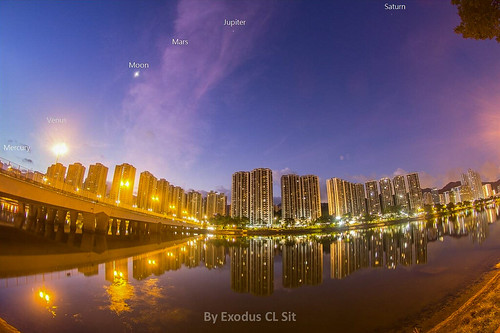 PSX_20220626_123655
PSX_20220626_123655 by
Exodus CL Sit, 於 Flickr
 PSX_20220624_110127
PSX_20220624_110127 by
Exodus CL Sit, 於 Flickr



